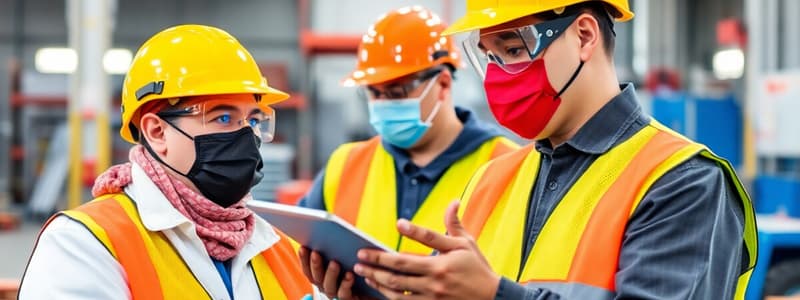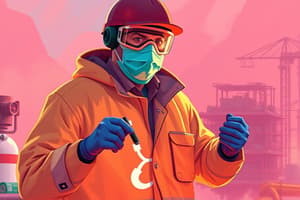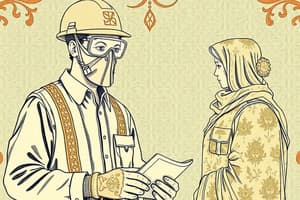Podcast
Questions and Answers
What is the permissible sound level exposure for an employee working for 4 hours a day?
What is the permissible sound level exposure for an employee working for 4 hours a day?
- 105 dB
- 90 dB
- 95 dB (correct)
- 100 dB
What is defined as the amount of noise reduction provided by hearing protectors?
What is defined as the amount of noise reduction provided by hearing protectors?
- Noise reduction rating
- Attenuation (correct)
- Decibel scale
- Sound level meter
At what average sound level does an employer need to establish a hearing conservation program?
At what average sound level does an employer need to establish a hearing conservation program?
- 80 dB
- 95 dB
- 85 dB (correct)
- 90 dB
Which type of earplugs are pre-formed and can be disposable or reusable?
Which type of earplugs are pre-formed and can be disposable or reusable?
What should be done if engineering and work practice controls do not lower noise exposure to acceptable levels?
What should be done if engineering and work practice controls do not lower noise exposure to acceptable levels?
What type of gloves offer superior chemical and wear resistance compared to those made of natural rubber?
What type of gloves offer superior chemical and wear resistance compared to those made of natural rubber?
Which gloves are recommended for handling organic acids and alkalis?
Which gloves are recommended for handling organic acids and alkalis?
Which chemical is not recommended for use with nitrile gloves?
Which chemical is not recommended for use with nitrile gloves?
What rating indicates a chemical that is rated as poor for glove resistance?
What rating indicates a chemical that is rated as poor for glove resistance?
Which glove material can withstand heavy use while providing sensitivity and dexterity?
Which glove material can withstand heavy use while providing sensitivity and dexterity?
What is the chemical resistance rating for formaldehyde when using neoprene gloves?
What is the chemical resistance rating for formaldehyde when using neoprene gloves?
Which gloves would be the best choice for handling ethylene glycol?
Which gloves would be the best choice for handling ethylene glycol?
How are nitrile gloves rated for protection against acetone?
How are nitrile gloves rated for protection against acetone?
Which statement about neoprene gloves is incorrect?
Which statement about neoprene gloves is incorrect?
What is the chemical resistance rating for glycerin when using nitrile gloves?
What is the chemical resistance rating for glycerin when using nitrile gloves?
What is the main requirement of the 2007 final rule regarding personal protective equipment (PPE)?
What is the main requirement of the 2007 final rule regarding personal protective equipment (PPE)?
Which of the following is NOT considered a physical hazard in the workplace?
Which of the following is NOT considered a physical hazard in the workplace?
During a hazard assessment, which activity is recommended as a first step?
During a hazard assessment, which activity is recommended as a first step?
Which of the following hazards relates to biologic risks in the workplace?
Which of the following hazards relates to biologic risks in the workplace?
Which type of hazard is related to the potential for burns or eye injuries due to extreme temperatures?
Which type of hazard is related to the potential for burns or eye injuries due to extreme temperatures?
What should be noted during the walkthrough survey aside from the basic layout of the facility?
What should be noted during the walkthrough survey aside from the basic layout of the facility?
Which of the following is an example of a health hazard that should be identified in a hazard assessment?
Which of the following is an example of a health hazard that should be identified in a hazard assessment?
What must existing PPE stocks meet?
What must existing PPE stocks meet?
When must employers inform employees about their own PPE?
When must employers inform employees about their own PPE?
Which ANSI standard is not related to Eye and Face Protection?
Which ANSI standard is not related to Eye and Face Protection?
What should be considered when selecting gloves for hand protection?
What should be considered when selecting gloves for hand protection?
Under which circumstance should an employee receive retraining regarding PPE?
Under which circumstance should an employee receive retraining regarding PPE?
Which of the following is a requirement for employer-provided PPE training?
Which of the following is a requirement for employer-provided PPE training?
Which standard is used for Foot Protection?
Which standard is used for Foot Protection?
What is a limitation regarding the selection of gloves for chemical protection?
What is a limitation regarding the selection of gloves for chemical protection?
Which type of equipment must meet ANSI standards according to the OSHA requirements?
Which type of equipment must meet ANSI standards according to the OSHA requirements?
What information should be displayed on the label inside a hard hat?
What information should be displayed on the label inside a hard hat?
What is a critical factor in ensuring a hard hat provides appropriate protection?
What is a critical factor in ensuring a hard hat provides appropriate protection?
What maintenance action can extend the useful life of protective headgear?
What maintenance action can extend the useful life of protective headgear?
Which of the following is NOT an acceptable method for maintaining hard hats?
Which of the following is NOT an acceptable method for maintaining hard hats?
What should be done if a hard hat shows signs of cracks or perforation?
What should be done if a hard hat shows signs of cracks or perforation?
How should protective headgear be stored?
How should protective headgear be stored?
What may reduce the electrical resistance of hard hats?
What may reduce the electrical resistance of hard hats?
Which accessory can be added to protective headgear for enhanced functionality?
Which accessory can be added to protective headgear for enhanced functionality?
What is the minimum adjustment increment for most adjustable protective headgear?
What is the minimum adjustment increment for most adjustable protective headgear?
Why is it important to maintain sufficient clearance between the shell and suspension system of a hard hat?
Why is it important to maintain sufficient clearance between the shell and suspension system of a hard hat?
Flashcards
Hazard Assessment
Hazard Assessment
A systematic process to identify any potential dangers in the workplace.
Personal Protective Equipment (PPE)
Personal Protective Equipment (PPE)
Any equipment worn by the employee to protect them from hazards.
Compression Hazards
Compression Hazards
Objects that might cause injury by crushing or trapping.
Chemical Hazards
Chemical Hazards
Signup and view all the flashcards
Identifying Sources of Electricity
Identifying Sources of Electricity
Signup and view all the flashcards
Identifying Sources of Harmful Dusts
Identifying Sources of Harmful Dusts
Signup and view all the flashcards
Identifying Potential for Falling Objects
Identifying Potential for Falling Objects
Signup and view all the flashcards
Permissible Noise Exposures
Permissible Noise Exposures
Signup and view all the flashcards
Attenuation
Attenuation
Signup and view all the flashcards
Noise Reduction Rating (NRR)
Noise Reduction Rating (NRR)
Signup and view all the flashcards
Hearing Conservation Program
Hearing Conservation Program
Signup and view all the flashcards
Pre-formed or Molded Earplugs
Pre-formed or Molded Earplugs
Signup and view all the flashcards
PPE Standards
PPE Standards
Signup and view all the flashcards
Employee-Owned PPE
Employee-Owned PPE
Signup and view all the flashcards
Eye and Face Protection Standards
Eye and Face Protection Standards
Signup and view all the flashcards
Head Protection Standards
Head Protection Standards
Signup and view all the flashcards
Foot Protection Standards
Foot Protection Standards
Signup and view all the flashcards
Electrical Rubber Insulating Equipment Standards
Electrical Rubber Insulating Equipment Standards
Signup and view all the flashcards
Hand Protection Standards
Hand Protection Standards
Signup and view all the flashcards
Chemical Protection Glove Selection
Chemical Protection Glove Selection
Signup and view all the flashcards
PPE Training Requirements
PPE Training Requirements
Signup and view all the flashcards
Hard Hat Fit
Hard Hat Fit
Signup and view all the flashcards
Daily Hard Hat Inspection
Daily Hard Hat Inspection
Signup and view all the flashcards
Hard Hat & Chemicals
Hard Hat & Chemicals
Signup and view all the flashcards
Hard Hat Storage
Hard Hat Storage
Signup and view all the flashcards
Hard Hat Replacement
Hard Hat Replacement
Signup and view all the flashcards
Hard Hat Label
Hard Hat Label
Signup and view all the flashcards
Hard Hat Accessories
Hard Hat Accessories
Signup and view all the flashcards
Hard Hat Cleaning
Hard Hat Cleaning
Signup and view all the flashcards
Hard Hat Removal
Hard Hat Removal
Signup and view all the flashcards
Hard Hat Degradation
Hard Hat Degradation
Signup and view all the flashcards
Neoprene gloves
Neoprene gloves
Signup and view all the flashcards
Nitrile gloves
Nitrile gloves
Signup and view all the flashcards
Chemical Resistance Selection Chart
Chemical Resistance Selection Chart
Signup and view all the flashcards
VG (Very Good)
VG (Very Good)
Signup and view all the flashcards
G (Good)
G (Good)
Signup and view all the flashcards
F (Fair)
F (Fair)
Signup and view all the flashcards
P (Poor)
P (Poor)
Signup and view all the flashcards
Chemicals marked with an asterisk (* )
Chemicals marked with an asterisk (* )
Signup and view all the flashcards
Methyl alcohol
Methyl alcohol
Signup and view all the flashcards
Nitric acid
Nitric acid
Signup and view all the flashcards
Study Notes
Personal Protective Equipment (PPE)
- OSHA guidance, not a standard or regulation
- Provides recommendations and descriptions of mandatory safety standards
- Intended to assist employers in providing a safe and healthful workplace
- Employers must comply with safety and health standards and regulations promulgated by OSHA or a state with an OSHA-approved state plan.
- General Duty Clause (Section 5(a)(1)) requires employers to provide a workplace free from recognized hazards likely to cause death or serious physical harm.
- Material is in the public domain and may be reproduced
- Information available in accessible formats for sensory-impaired individuals
Introduction
- Hazards exist in every workplace (e.g., sharp edges, falling objects, chemicals, noise)
- OSHA requires employers to protect employees from workplace hazards that can cause injury
- Controlling a hazard at its source is the best method.
- OSHA recommends engineering and work practice controls
- When these are not feasible, provide PPE to minimize exposure.
The Requirement for PPE
- In general, employers are responsible for:
- Performing a hazard assessment of the workplace to identify physical and health hazards.
- Identifying and providing appropriate PPE for employees.
- Training employees on the use and care of PPE.
- Evaluating and maintaining PPE.
- Employees are responsible for:
- Properly wearing PPE.
- Attending training sessions on PPE.
- Caring for, cleaning, and maintaining PPE.
- Informing a supervisor if PPE needs to be repaired or replaced.
The Hazard Assessment
- A critical first step to protect employees.
- Identifying physical and health hazards in the workplace (e.g., falling objects, chemicals, radiation).
- Examples of potential hazards:
- Fall hazards, impact, penetration, compression, chemical hazards, heat/cold, harmful dust, light radiation (optical), biologic hazards.
- The assessment involves a walkthrough of the facility to identify potential hazards.
Selecting PPE
- PPE should be of safe design and construction.
- Fit and comfort of PPE should be considered when selecting
- Proper sizing for each employee to ensure safety
- Compatible designs for multiple pieces of PPE
- PPE must clearly identify the manufacturer.
Training Employees in the Proper Use of PPE
- Employees must be trained in aspects like:
- When and what PPE is necessary.
- Proper donning, doffing, adjustment, and wearing of PPE.
- Limitations of PPE.
- Proper care, maintenance, useful life, and disposal of PPE.
- Ensure employees understand and can correctly use PPE before performing tasks.
Eye and Face Protection
- Eye and face hazards (e.g., flying particles, molten metal, chemicals, acids).
- Important to use appropriate eye protection, if necessary, over corrective lenses.
- Examples of hazards: dust, metal chips, chemical splashes, objects, radiant energy (lasers).
Head Protection
- Protecting employees from head injuries (impact, penetration, electrical shock).
- Employers are required to provide head protection in certain situations, e.g., objects falling from above (exposed pipes/beams), electrical hazards.
- Hard hats should resist penetration, absorb shock, and be water-resistant & slow burning.
Foot and Leg Protection
- Suitable footwear for protecting against falling or rolling objects, crushing/penetrating materials, hot substances and corrosive materials.
- Examples include when working with sharp objects, molten metal spills, hot or wet surfaces, electrical hazards.
Hand and Arm Protection
- Protecting employees from injury (chemical absorption, burns, abrasions, cuts, punctures, fractures, electrical dangers).
- Different types of gloves for different risks (chemicals, heat, cuts, abrasions).
Body Protection
- Protecting from injuries/hazards (e.g., temperature extremes, hot splashes, hazardous materials).
- Examples of necessary garments: laboratory coats, coveralls, vests, jackets, aprons, surgical gowns.
Hearing Protection
- If noise levels are high, hearing protection is required
- Noises above 85 dB are significant risks to employee safety,
- Includes earplugs, earmuffs.
Personal Fall Protection Systems
- Required for workplaces with fall risks
- Types of systems for different risk environments.
- System Components must be compatible and have certain strength to resist impact (at least 5000 pounds).
OSHA Assistance, Services, and Programs
- Information and services available from OSHA to help employers comply with OSHA law.
- Cooperative programs to help employers improve safety and health standards.
- Specialized support for small businesses & no-cost consultation.
Appendix A: OSHA Standards that Require PPE
- Lists specific OSHA standards requiring PPE for different industries/tasks.
How to Contact OSHA
- Provides contact information for OSHA.
Studying That Suits You
Use AI to generate personalized quizzes and flashcards to suit your learning preferences.




